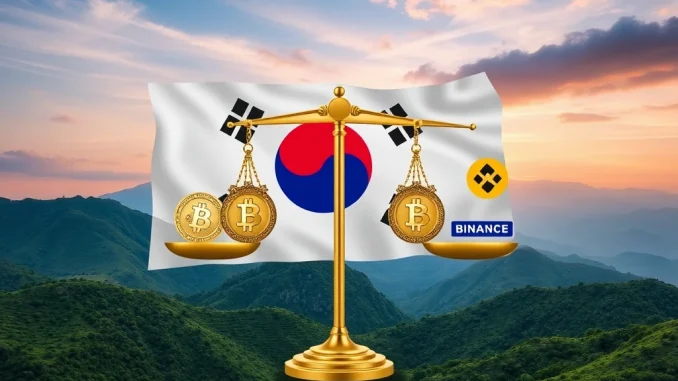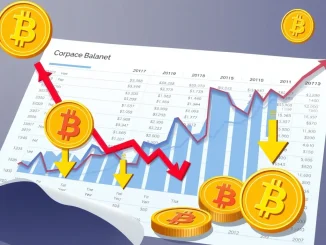
Hey crypto enthusiasts! Let’s dive into a fascinating corner of the global market – South Korea. Right now, a key indicator for this region, the Kimchi Premium, is sitting at a neutral level. This might sound technical, but it has real implications for anyone watching the South Korea crypto scene or looking at international Bitcoin prices.
What Exactly is the Kimchi Premium?
Think of the Kimchi Premium as a gauge for how much more (or less) expensive Bitcoin is trading on South Korean exchanges compared to international platforms. It’s measured by comparing the Bitcoin unit price on a major Korean exchange, like Upbit, against a leading global exchange, such as Binance. Historically, Bitcoin prices in Korea have often traded at a premium, sometimes significantly higher than global rates. This premium is named after kimchi, a staple Korean dish.
Why does this difference occur? Several factors contribute, including:
- Capital Controls: Strict regulations can make it difficult and expensive for large amounts of money to flow freely in and out of South Korea.
- High Local Demand: South Korea has a large and enthusiastic crypto trading community, which can sometimes outpace the available supply on local exchanges.
- Regulatory Environment: The specific rules governing crypto trading and exchanges within South Korea can create unique market dynamics.
Bitcoin Price Korea: Comparing Upbit and Binance
The core of measuring the Kimchi Premium lies in comparing prices across exchanges. Our initial data point shows the Bitcoin price Korea on Upbit is currently $101,719, matching the price on Binance. This perfect alignment signifies a neutral premium.
Let’s visualize this comparison:
| Exchange | Current Bitcoin Price |
|---|---|
| Upbit (South Korea) | $101,719 |
| Binance (Global) | $101,719 |
When the price on Upbit is higher than Binance, we have a positive Kimchi Premium. When it’s lower, it’s a discount (sometimes called the ‘reverse Kimchi Premium’). A neutral premium, as seen now with the matching Upbit Binance price, indicates equilibrium.
What Does a Neutral Kimchi Premium Mean for Crypto Arbitrage?
For traders, the Kimchi Premium is particularly interesting because it can signal opportunities for crypto arbitrage. Arbitrage involves buying an asset on one exchange where it’s cheaper and immediately selling it on another exchange where it’s more expensive, pocketing the difference.
Here’s how it typically works with the Kimchi Premium:
- Positive Premium: Bitcoin is more expensive in South Korea. Arbitrageurs would theoretically buy BTC on a global exchange (like Binance) and sell it on a Korean exchange (like Upbit).
- Negative Premium (Discount): Bitcoin is cheaper in South Korea. Arbitrageurs would theoretically buy BTC on a Korean exchange and sell it on a global exchange.
- Neutral Premium: When the Upbit Binance price is the same, there is no significant price difference to exploit. Arbitrage opportunities related to this specific premium disappear.
A neutral premium suggests that these cross-border price disparities are currently non-existent or too small to be profitable after accounting for transaction costs, withdrawal fees, and the complexities of moving funds in and out of South Korea.
Historical Context: When the Premium Was High
The Kimchi Premium isn’t always neutral. It has seen dramatic swings. During periods of intense retail FOMO (Fear Of Missing Out) in South Korea, particularly during bull markets, the premium has soared to significant levels, sometimes exceeding 20% or even higher. These periods highlighted the strong local demand and the friction in moving supply into the country. Conversely, during market downturns, the premium has sometimes flipped into a discount.
Why is the Kimchi Premium Neutral Now?
The current neutral state likely reflects a balance between local supply and demand, potentially influenced by more stable market conditions globally and within South Korea. It could also indicate that arbitrageurs have been effective in closing the price gap whenever it starts to appear, or that the barriers to conducting such trades remain high enough to prevent sustained premiums or discounts. The matching Bitcoin price Korea on Upbit and the global price on Binance suggests market forces are currently in equilibrium across these platforms.
Looking Ahead: Will Neutrality Last?
Predicting the future of the Kimchi Premium is challenging. It depends heavily on shifts in South Korean regulations, changes in local investor sentiment, global market movements, and the ongoing effectiveness of arbitrage strategies. While currently neutral, the premium could reappear if there’s a sudden surge in local demand or changes in capital controls. Traders and analysts will continue monitoring the Upbit Binance price comparison closely for any shifts.
Compelling Summary
In conclusion, the Kimchi Premium, a key indicator for the South Korea crypto market, is currently neutral, with the Bitcoin price Korea on Upbit matching the global rate on Binance. This eliminates immediate crypto arbitrage opportunities based on this specific price difference. The neutral Upbit Binance price reflects a temporary equilibrium in the market dynamics that have historically caused significant premiums or discounts. While the current state offers stability, the factors influencing the premium are dynamic, making continued monitoring essential for understanding the unique pulse of the South Korean crypto landscape.



